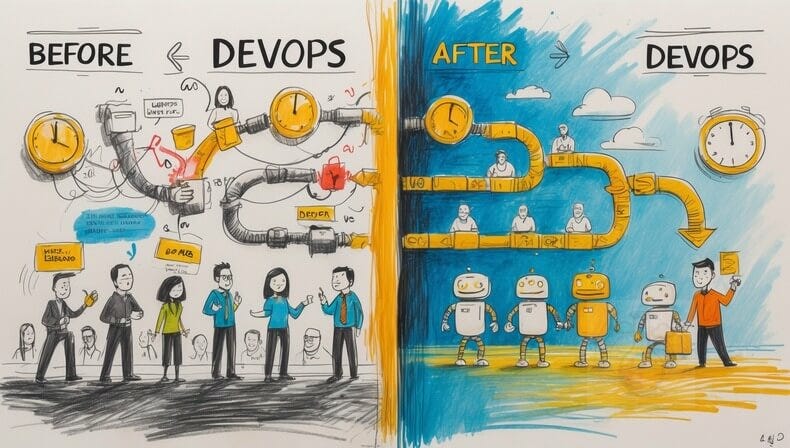What Is DevOps and Why It Matters?
Learn what DevOps actually means in plain English, why it matters for developers and operations teams, and how to start implementing DevOps practices.
So you have finally stumbled upon this buzzword called "DevOps" that was thrown around in your meeting or was found in a job description, or some tech article that you happen to come across, or maybe, just maybe your boss announced "We’re adopting DevOps practices!" and you smiled and nodded while secretly thinking, "I absolutely have no freaking idea what that means, but hey it sounds expensive."
Well, don’t worry, my friend. You’re not alone in your confusion. Let me break it down for you in plain English – no jargon potions required.
What the Heck Is DevOps, Anyway?
At its most basic, DevOps is like that friend who’s really good at getting people to stop fighting and work together.
Instead of your friends who are constantly at each other’s throats, it’s the development team (the engineers who write code) and the operations team (the engineers who keep the systems running and green lights glowing).
In ancient times (and even today), these teams operated like separate kingdoms!
Development Kingdom: "We built this awesome and amazing new feature! Can you go ahead and just deploy it!"
Operations Kingdom: "This ‘awesome new feature’ crashed our servers three times. NO MORE CHANGES EVER." (Turning the systems into Gandalf blocking the path for the new changes to roll out 😅)
Then, DevOps came along and said: "Hey, what if – and hear me out – what if you two actually talked to each other and worked together?"
Let's Break it Down
DevOps isn’t a concoction derived by mixing "Development" and "Operations"; it’s actually more than that.
DevOps is a philosophy encompassing a set of practices and tools. Even more importantly, it’s a cultural shift that will help any team or organization to:
Speed up delivery of new features and fixes
Improve reliability of your systems
Build better communication between teams
Automate tedious, repetitive tasks (because life’s too short)
Create systems that can recover quickly when things inevitably go wrong
Think of DevOps as the digital equivalent of having your cake and eating it too. You get to move fast AND not break things.
Why Should You Give a Hoot?
By now, maybe you are probably thinking, "Well, all this is good, but why should I bother or care about it? I only wish to do my job and get my work done."
It’s a great question! Here’s why DevOps matters to real humans:
If You're a Developer:
Ship faster: Get your code to users quicker (and feel that dopamine rush of seeing your work live)
Less midnight panic: Fewer 2 AM calls about production fires
Focus on cool stuff: Spend more time coding and less time combating other issues
Job security: Armed with all the DevOps skills will make you more appealing to companies (There is your Gold!)
If You're an Operations Engineer:
Fewer surprises: No more "peek-a-boo" deployments that bring everything crashing down
Better sleep: More stable systems mean fewer middle-of-the-night emergencies
Respect: Developers will finally understand why you were saying "no" all those times
Automation: Why would you want to keep doing those repeating mundane tasks daily? Automate it!!!
If You're in Management:
Faster time to market: All the new shiny features get to all the customers quicker! (Better than Prime Delivery)
Happier teams: Less friction, more collaboration
Better quality: Fewer bugs reaching production
More innovation: Teams have time to experiment and improve
Cost savings: Fewer outages transmute into more bags of Gold! Who doesn't like Gold?
The Core Ingredients of this Potion
DevOps isn’t that over-the-counter product you can buy or a single engineer that you can hire and call it done.
It’s more like a recipe that requires several key ingredients to be really effective:
1. Automation
Remember that tedious task your friend at work has done 500 times and will probably continue to do another 500 times? Well, Automate it!
DevOps love automation, similar to cats who love knocking things off tables – enthusiastically and at every opportunity.
Here are some common automation targets:
Building code
Running tests
Deploying applications
Setting up infrastructure
Monitoring systems
2. Continuous Integration (CI)
Think of CI as that "responsible adult who washes the dishes right after your meal". I don’t want to wake up or have a sink full of regret and buggy code and I am sure neither do you, right?
So with CI, essentially Developers merge their code changes into the code repository frequently, and automatic tests verify everything is working as expected.
3. Continuous Delivery/Deployment (CD)
This is about getting code ready for prime time.
Continuous Delivery: Imagine your code as one of your friends who is always dressed and ready to hit the club. You are the one who gets to decide when you are going to the club. Similarly, your code will be prepared for you when you feel like deploying it.
Continuous Deployment: This is the wild child move. 😅 It’s like that friend of yours who will always say, "Screw the guest list!" let’s just go right into the club. No hesitation! Actually, deploying every change automatically. (This one is for the brave!)
4. Infrastructure as Code (IaC)
Instead of clicking around in a control panel to set up servers, you write code that represents your infrastructure.
This literally means you can:
Track changes over time
Test infrastructure changes
Replicate environments exactly
Create new environments in minutes instead of weeks
5. Monitoring and Logging
We all know that you can’t make a potion if you can’t see the ingredients, right?
It’s exactly the same here with DevOps, which is precisely why it emphasizes keeping a close eye on all the systems with:
Performance monitoring
Centralized logging
Alerting for issues
Visualizing system health
6. Communication and Collaboration
Imagine a universe where developers and operations engineers actually chill together, share potions 🥂 and experiment together. Revolutionary, I know!
Real Talk: DevOps Horror Stories vs. Success Stories
The Horror: Life Before DevOps
"We had a three-month release cycle. Development worked on features for 3 months, then threw them over the wall to Operations for deployment. Every release was a nightmare of broken dependencies, missing configurations, and unexpected behavior. Our last release took 72 hours of non-stop work, three pizza deliveries, and someone crying in the server room." - Anonymous Tech Lead.
The Success: DevOps Transformation
"Now we deploy 20 times a day. Each change is small, automatically tested, and can be rolled back instantly if there’s a problem. Our on-call engineers haven’t been paged at night in months. People actually volunteer for deployment duty now!" - Same Tech Lead, One Year Later.
How to Get Started with DevOps (Without Losing Your Mind)
Don’t try to expect to change everything overnight! This is not an instant fix.
You will have to start small:
Automate one annoying task that your team does regularly.
Set up a basic CI pipeline for a non-critical project.
Improve one communication channel between the dev and ops teams.
Learn one infrastructure-as-code tool like Terraform or CloudFormation.
Implement essential monitoring so you know when things break.
Remember: With DevOps, it’s the journey, not the destination. Make sure you are focused on continuous improvement and not overnight perfection.
The Tools of the Trade (No Sales Pitch Here!)
There is a big library compromising of DevOps tools that you can leverage out there, but here are some of the commonly used tools of trade to start:
Version Control: Git (This can be GitHub, GitLab, or Bitbucket)
CI/CD: Jenkins, GitHub Actions, GitLab CI, CircleCI
Infrastructure as Code (IaC): Terraform, AWS CloudFormation, Pulumi
Configuration Management: Ansible, Chef, Puppet
Containerization: Docker, Podman
Container Orchestration: Kubernetes, Docker Swarm
Monitoring: Prometheus, Grafana, ELK Stack (Elasticsearch, Logstash, Kibana)
Don’t get overwhelmed! You don’t need all of these to start. Begin with version control and one CI/CD tool, then expand as you grow.
Is DevOps the Right Potion for Your Team?
Short answer: Most likely Yes.
Longer answer: If your team builds or maintains software, some DevOps practices can help you. But the specific implementation will vary based on your:
Team size
Industry
Regulatory requirements
Technical stack
Current pain points
The elegance of DevOps is that it’s not about all-or-nothing. It’s like building with Lego blocks. You can adopt practices gradually and adapt them to your specific situation.
The DevOps Journey: Next Steps
If you’re enthralled by DevOps (which I hope you are by now!), here are some ways to learn more:
Start small: Take baby steps. Implement one practice at a time.
Literature: I would highly recommend reading "The Phoenix Project" or "The DevOps Handbook."
Learn by doing: Set up a CI/CD pipeline for a personal project.
Join communities: Join the community online on your platform of choice. There are many discord groups, sub-reddit, forums, etc. Pick your potion.
Subscribe to my Newsletter: I plan to do deeper dives into specific DevOps tools and practices in the future. You wouldn’t want to miss it! 😉
Wrapping Up: DevOps in One Sentence
If I had to explain this in one sentence, DevOps is all about removing the barriers between development teams and operations teams so you can build better software faster, deploy it reliably, and spend less time putting out fires.
Or even shorter: Work smarter and Play harder 🤣.
When someone says "DevOps" in a meeting, I hope you can nod knowingly – and maybe even contribute something to the conversation.
Disclaimer: No development or operations engineers were harmed as I was making this post. However, several cups of coffee were sacrificed to the gods of late-night writing. This post is based on real-world experience, which means some of these DevOps lessons were learned the hard way. You’re welcome for my suffering – may your path be smoother!
Do you have questions about DevOps? Drop them in the comments below! What’s your biggest DevOps challenge or success story?
Thank you for reading!
If you found it valuable, hit a like ❤️ and consider subscribing for more such content every week.
If you have any questions or suggestions, leave a comment.
This post is public so feel free to share it.
P.S. If you’re finding this newsletter helpful and want to get even more value, consider becoming a subscriber. It’s Free!






